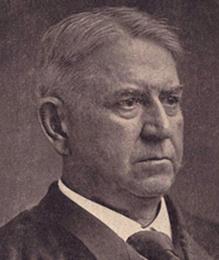- COVID-19 Project
- Home
- Archival Material
- College History Projects
- Subject-Based Digital Projects
- Carlisle Indian School Resources
- LGBT History Project
- Three Mile Island (TMI) Resources
- Civil War Resources
- James Buchanan Resources
- Slavery and Abolition in the U.S.
- Russian and Slavic Resources
- AIFS / AIFS Foundation Collection
- Books of Isaac Norris
- Writings by Dickinsonians
- Digital Images on Flickr
- Dickinson @ Internet Archive
William Uhler Hensel (1851-1915)

William Uhler Hensel was born in Quarryville in Lancaster County, Pennsylvania on December 4, 1851. He was one of the five sons and nine children of George Washington Hensel, a prominent and wealthy businessman and his wife Ann Maria Uhler Hensel. He was educated first in local public schools and then attended several private academies in the area before entering the local Franklin and Marshall College's preparatory school. He enrolled at Franklin and Marshall as an undergraduate in 1866 and graduated in 1870 at the head of his class. He immediately began the study of law under Judge Isaac Hiester and then David G. Eshleman, an 1840 Dickinson graduate. He was admitted to the Lancaster bar in January, 1873 and opened a practice in the city.
While a law student Hensel had written for local newspapers and in May 1874 launched in earnest an eminent dual career in journalism and the law when he bought an half interest in the Lancaster Intelligencer and became its editor. Both his professional careers came into the public eye in 1880 when a Lancaster County judge the Intelligencer had challenged over a case brought charges of contempt of court and disbarment against Hensel and his co-owner. In a celebrated case, argued all the way to the United States Supreme Court where, in a case argued by Andrew McClure and Rufus Shapley, the rulings of the lower courts were reversed and the two men were reinstated to the bar. Hensel had already become an enthusiastic supporter of Democratic politics and by 1882 had been chairman of the county committee, a delegate to the national convention, and prominent in the successful campaign of Robert E. Pattison for the Pennsylvania governorship in 1882. He served as the state party chairman for an unprecedented four terms between 1883 and 1887. He also involved himself on the national scene as a prolific writer of campaign biographies for Democratic candidates, including Vice-President Hendricks in 1884 and for both President Cleveland and his running-mate Allen G. Thurman in their unsuccessful 1888 campaign.
As his national political involvement increased, he sold his share in the Intelligencer in 1886 and turned his attentions more closely to his legal career, forming a lucrative firm with J. Hay Brown in 1887. In 1891, Governor Pattison appointed him as attorney-general of Pennsylvania, a position in which he served with distinction, exhibiting particularly diligence in rooting out official corruption, trying both the state auditor-general and the state treasurer before the Senate. He was named as the president of the state bar in 1898 and served as the vice-president of the American Bar Association.
During all of his busy life, Hensel managed a remarkable cultural and philanthropic involvement, particularly in his home city. He helped found the Lancaster Historical Society and served as president of the Pennsylvania-German Society of Pennsylvania. He also worked on the board of directors of the Lancaster Charity Society. He was in great demand as a speaker on all manners of topics concerning the county and he was the author of several erudite studies of local life, from Resources and Industries of the City of Lancaster, written for the Lancaster board of trade in 1887, to his influential account The Christiana Riot and the Treason Trials of 1851: An Historical Sketch written in 1911.
As a young man, Hensel had married Emily Flinn of Lancaster and the couple had one daughter, Elizabeth, before Emily Hensel's untimely death in 1882. Hensel spent the remainder of his life as a widower. He was a tireless supporter of his alma mater and served as an influential member of its board of trustees and as president of that body in 1914. Franklin and Marshall awarded him an honorary doctorate in 1912; Dickinson College, in neighboring Cumberland County, Pennsylvania, had already accorded him that honor in 1909. In the spring of 1914 Hensel's health went into decline and cirrhosis of the liver was discovered. He gave up his practice and took a trip to Florida and South Carolina for the sake of his increasingly fragile condition but he died in Savannah, Georgia in the early morning hours of February 27, 1915. He was sixty-three years old.
Date of Post:
2005
College Relationship:
Honorary Degree - Year:
1909